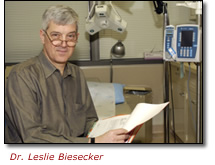Last updated: May 09, 2012
Two NHGRI Researchers Recognized by The Association of American Physicians
Two NHGRI Researchers Recognized by The Association of American Physicians
The Association of American Physicians (AAP) recently honored the scientific accomplishments of two National Human Genome Research Institute (NHGRI) researchers whose work focuses on human development. Leslie G. Biesecker, M.D., a senior investigator in NHGRI's Genetic Disease Research Branch, and Maximilian Muenke, M.D., a senior investigator in NHGRI's Medical Genetics Branch, were inducted into AAP's distinguished membership April 30 at the organization's annual meeting in Chicago.
 Dr. Biesecker's work centers on birth defects that cause physical malformations, with emphasis on two main areas. The first is multiple congenital anomaly syndromes that produce central nervous system malformations, visceral malformations, and extra fingers and toes. These conditions include Pallister-Hall syndrome, Greig cephalopolysyndactyly syndrome, McKusick-Kaufman syndrome, Bardet-Biedl syndrome and Lenz microphthalmia syndrome. The second area of investigation involves the study of segmental overgrowth disorders, such as Proteus syndrome. These abnormalities cause excessive growth of bones, organs and fatty tissues after birth and sometimes carry an increased risk of cancer. They are hard to diagnose because they produce a wide variety of symptoms that can vary within each disease, and very few people have studied them long enough to know their natural history. Dr. Biesecker's laboratory is trying to better characterize the clinical manifestations of such disorders, as well as conducting intensive genetic analyses of the tissues of affected and unaffected people to locate the genes involved.
Dr. Biesecker's work centers on birth defects that cause physical malformations, with emphasis on two main areas. The first is multiple congenital anomaly syndromes that produce central nervous system malformations, visceral malformations, and extra fingers and toes. These conditions include Pallister-Hall syndrome, Greig cephalopolysyndactyly syndrome, McKusick-Kaufman syndrome, Bardet-Biedl syndrome and Lenz microphthalmia syndrome. The second area of investigation involves the study of segmental overgrowth disorders, such as Proteus syndrome. These abnormalities cause excessive growth of bones, organs and fatty tissues after birth and sometimes carry an increased risk of cancer. They are hard to diagnose because they produce a wide variety of symptoms that can vary within each disease, and very few people have studied them long enough to know their natural history. Dr. Biesecker's laboratory is trying to better characterize the clinical manifestations of such disorders, as well as conducting intensive genetic analyses of the tissues of affected and unaffected people to locate the genes involved.
 Dr. Maximilian Muenke is looking at birth defects that lead to neurological impairment, with particular emphasis on holoprosencephaly (HPE) and attention deficit hyperactivity disorder (ADHD). A common brain birth defect that causes varying degrees of developmental disability and mental retardation, HPE occurs when the brain fails to divide into left and right hemispheres before birth. Dr. Muenke's laboratory has identified several genes associated with HPE and, in the process, discovered many molecular events that govern early embryonic development. The team is also studying environmental factors that may affect development of HPE, such as low cholesterol in pregnant women. While ADHD has been recognized for many years, environmental influences were thought to be its main cause, and genetic influences have only recently been explored. Dr. Muenke's group is collaborating in a study involving 18 large, multigenerational Colombian families with a high incidence of ADHD. A companion study of 1,000 smaller, similarly affected U.S. families is also underway. So far, Dr. Muenke's laboratory has found strong evidence for familial ADHD, and identified several candidate regions that might harbor ADHD-causing genes.
Dr. Maximilian Muenke is looking at birth defects that lead to neurological impairment, with particular emphasis on holoprosencephaly (HPE) and attention deficit hyperactivity disorder (ADHD). A common brain birth defect that causes varying degrees of developmental disability and mental retardation, HPE occurs when the brain fails to divide into left and right hemispheres before birth. Dr. Muenke's laboratory has identified several genes associated with HPE and, in the process, discovered many molecular events that govern early embryonic development. The team is also studying environmental factors that may affect development of HPE, such as low cholesterol in pregnant women. While ADHD has been recognized for many years, environmental influences were thought to be its main cause, and genetic influences have only recently been explored. Dr. Muenke's group is collaborating in a study involving 18 large, multigenerational Colombian families with a high incidence of ADHD. A companion study of 1,000 smaller, similarly affected U.S. families is also underway. So far, Dr. Muenke's laboratory has found strong evidence for familial ADHD, and identified several candidate regions that might harbor ADHD-causing genes.
The AAP was founded in 1885 to advance scientific and practical medicine, promote collegial connections among physicians and encourage the dissemination of scientific knowledge. Each year, the AAP elects 55 new members whose outstanding scientific achievements have improved patient care.
Other NHGRI researchers who have been honored by membership in AAP include Francis S. Collins, M.D., Ph.D.; William A. Gahl, M.D., Ph.D.; Pu Paul Liu, M.D., Ph.D.; and Paul Meltzer, M.D., Ph.D. They have joined a distinguished group that includes Nobel laureates and members of the National Academies of Science and the Institute of Medicine